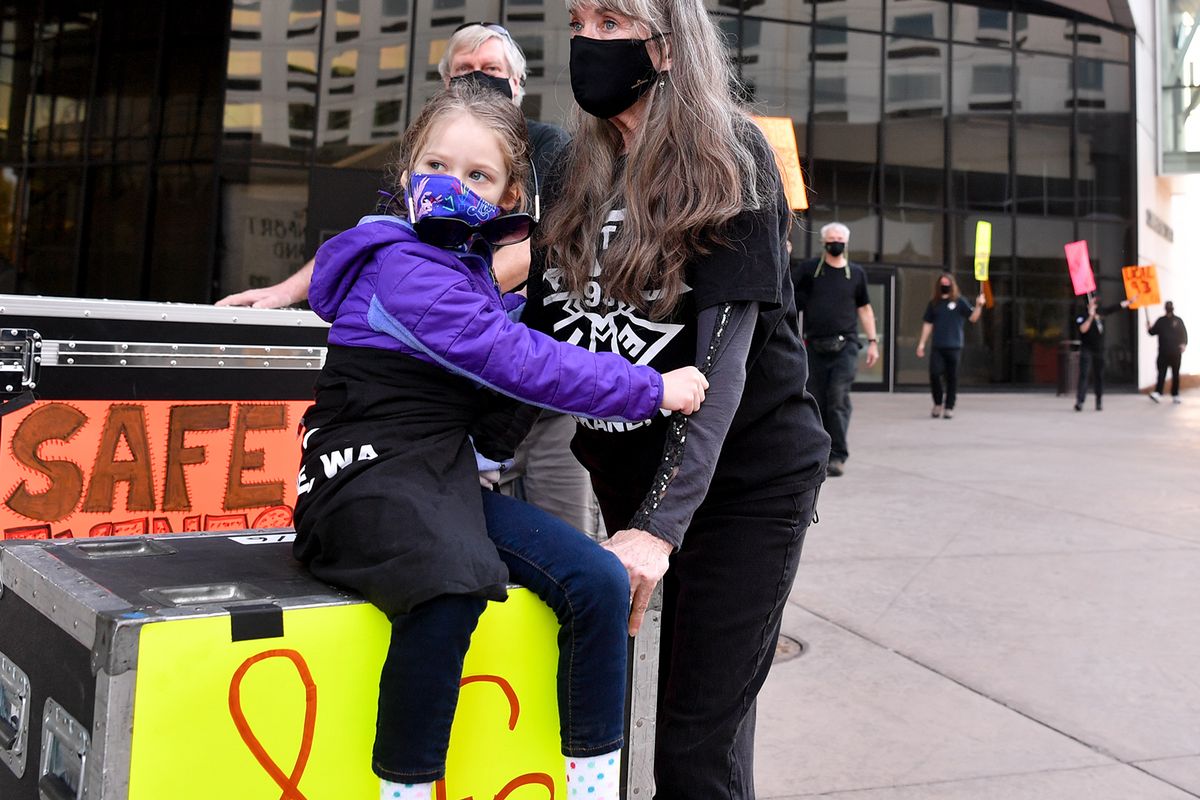Without work for a year, hope is growing among ‘backstage ninjas’ that they’ll be helping entertain Spokane soon

Jim Volke’s pandemic souvenir is his 2020 scheduling book.
After March 13, 2020, it’s a calendar of events that never happened. Show after show crossed out.
“It is too early to be funny,” said Volke, a stagehand and lighting technician. “But it is stunning.”
He and about 60 other members of Spokane’s Local 93 of the International Alliance of Theatrical Stage Employees marked a year without work Saturday afternoon with a brief walking parade from the Spokane Convention Center to the First Interstate Center for the Arts and back. Many of them pushed along their gear – much of which has been boxed, unlit or silent for a year.
Local 93 represents technicians, costumers, makeup artists, audio engineers, videographers, truck loaders, carpenters, electricians and other artists mostly unseen by audiences. They’re the “backstage ninjas,” as Jill Scott, Local 93’s secretary, described them. The union has about 75 members and works with about 100 others called in when needed.
The walk down the sidewalk wasn’t a protest of the pandemic rules forcing shows to cancel.
“I understand 100% why we’re doing this,” said Scott, a 20-year member of the union. “We want to work again, but we want to work safely – hopefully soon.”
They described the walk as a celebration of their profession and the growing hope that they may return to work in a matter of months. They urged people to get vaccinated when they can and to continue to follow mask rules to tamp down the virus that’s sidelined them.
“This is just to highlight how much we miss you and that we’re ready to get back,” said Margaret Ayers, the wardrobe lead and a Local 93 member since 1993.
Scott noted that some shows scheduled for August remain on the calendar.
She’s also hopeful that the outdoor stage purchased as part of the remaking of the U.S. Pavilion in Riverfront Park will ease Spokane back into hosting live shows since outdoor events are considered safer. Planning is underway for shows during Pig Out in the Park Labor Day weekend.
Many of the participants in the walk said they knew the coronavirus was a concern before the cancellations. But the disruption it proved to be was unthinkable to most of them.
“The last Broadway show, there was someone walking around with a mask, and I was curious,” Ayers said.
A Tool concert at the Spokane Arena on March 9, 2020, was the last show for many local stagehands.
The steward for the show was George Lathrop, who started work as a stagehand just before Expo ’74.
A big-name act may bring 20 semitrucks to the arena, and with them a barrage of logistical and technical challenges.
So the possibility that COVID-19 could upend the industry wasn’t on Lathrop’s mind as they prepared for the concert.
“I wouldn’t have had a clue that day. We had 112 stagehands,” Lathrop said. “I was just thinking about getting through that show.”
Brandii Burke worked the Tool show but had one last gig at the Knitting Factory. Soon after, she got a call from her boss that the venue’s remaining shows that month were canceled.
“For me, I knew right away – that we’re the last ones who are going back to work,” said Burke, who’s been a stagehand for 11 years.
Volke’s last live event work was at the Spokane County Fair and Expo Center, where he was providing lighting production for the Inland Northwest Motorcycle Show.
“They called me a year ago today and said, ‘Don’t show up,’ ” Volke said as he walked with his fellow theater workers.
But organizers still planned to open the next weekend. It didn’t happen.
A few weeks after the motorcycle show, he lost 35% of the work that remained on his calendar in one day. Whatever was left eventually was canceled, too.
Many theater workers have been sustained by unemployment benefits. Others have relied on other jobs or businesses. Some picked up new work.
“It’s really been unnerving,” Scott said. “Thank God for unemployment. Thank God for pandemic relief.”
Some, however, left the business.
“We lost a lot of good, young talent that had to move on,” said Volke, who’s been in the business for more than 25 years .
Maria Sorce lost about 25% of her income and didn’t qualify for unemployment because she has a full-time job at Whitworth University. The reality of the pandemic became clear to her not just through show cancellations, but when the classes she teaches went virtual.
“We haven’t gotten to share our art with audiences for a year, and for us as artists it’s been traumatic,” said Sorce, who got her first stagehand gig when she was 8 years old at a community theater in Wisconsin. “We look forward to the day when we can gather again and perform our art.”
Luis Yzaguirre, head truck loader, has relied on his other work, including as a health care worker. There have been bright parts of the last year for Yzaguirre and his family. He has a new grandson, and the pandemic isolation has brought him closer to family.
But. …
“I’m ready to start entertaining people,” he said. “We are here and we will help entertain you once again.”